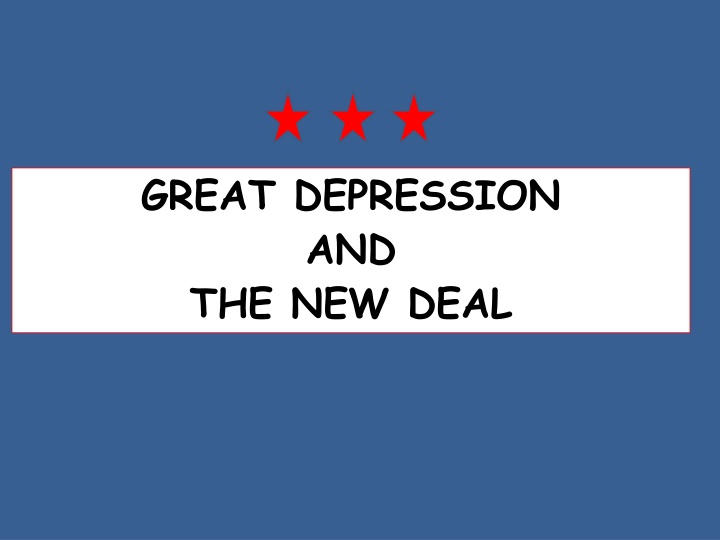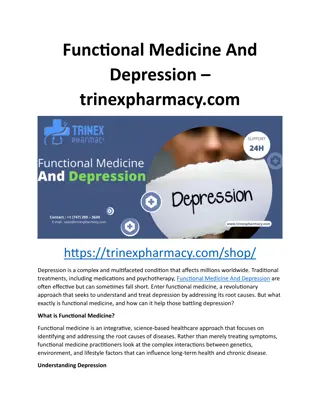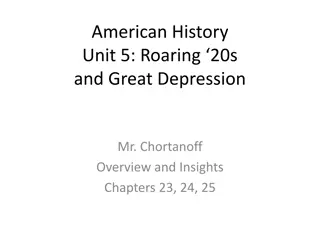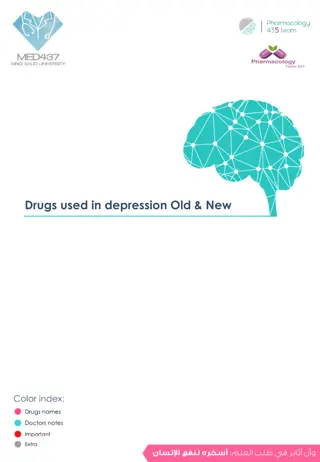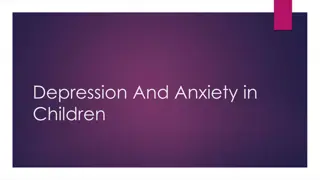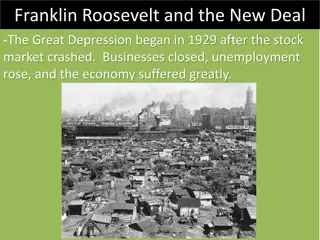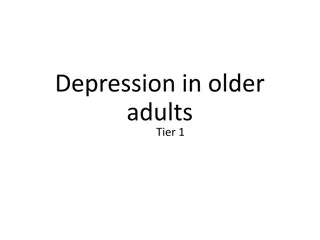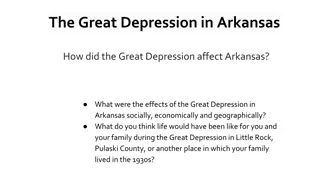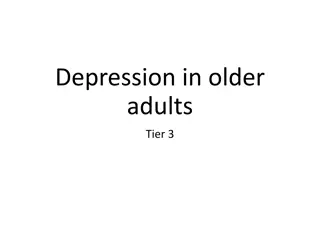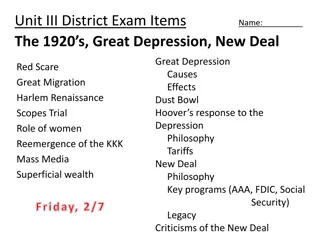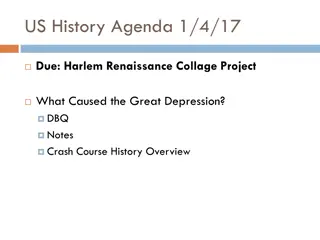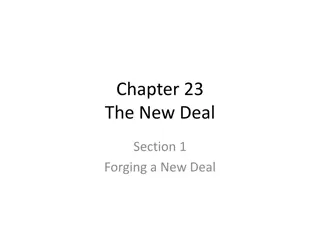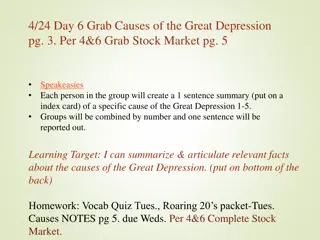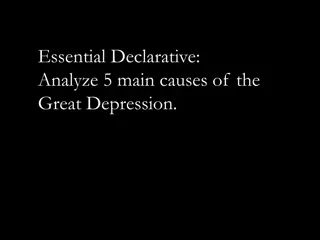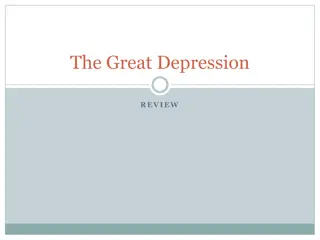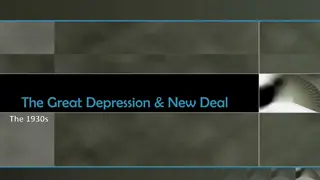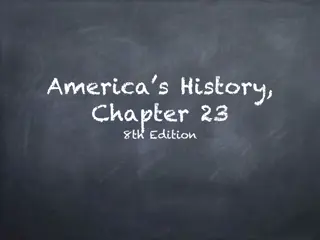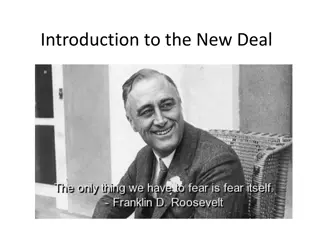The Great Depression and The New Deal: Causes, Impact, and Solutions
The Great Depression of the 1930s was a period marked by economic devastation, high unemployment, and social upheaval. Overproduction, speculation, uneven income distribution, and shaky banking practices led to the economic collapse. The human impact was severe, with high unemployment, bank failures, and foreclosures. The New Deal, introduced by President Franklin Roosevelt, aimed at providing relief, recovery, and reform through programs like the Civilian Conservation Corps and Social Security Act.
Download Presentation

Please find below an Image/Link to download the presentation.
The content on the website is provided AS IS for your information and personal use only. It may not be sold, licensed, or shared on other websites without obtaining consent from the author.If you encounter any issues during the download, it is possible that the publisher has removed the file from their server.
You are allowed to download the files provided on this website for personal or commercial use, subject to the condition that they are used lawfully. All files are the property of their respective owners.
The content on the website is provided AS IS for your information and personal use only. It may not be sold, licensed, or shared on other websites without obtaining consent from the author.
E N D
Presentation Transcript
GREAT DEPRESSION AND THE NEW DEAL
CAUSES OF THE GREAT DEPRESSION OVERPRODUCTION More products made than people could buy SPECULATION Led to crash in 1929. People invested in rising stock prices. Speculation in real estate holdings; prices fell in a crash in October 1929. UNEVEN DISTRIBUTION OF INCOME SHAKY BANKING PRACTICES Bankers invested depositors money poorly RESTRICTED INTERNATIONAL TRADE Americans put up high protective tariffs, restricting international trade
HUMAN IMPACT OF THE DEPRESSION NO SAFETY NET High unemployment, bank failures and foreclosures RECORDING THE MISERY: DORTHEA LANGE: Recorded the misery of the people in her photographs JOHN STEINBECK Wrote about the suffering of migrant families during the Depression in a series of articles. Grapes of Wrath DUST BOWL (1930s) Heavy winds carried top soil away, buried homes, and destroyed harvests. Over a million farmers were driven off their land.
FDRFRANKLIN ROOSEVELT BRAIN TRUST Group of talented advisers to the President FIRESIDE CHATS Roosevelt used the radio to speak directly to the American people NEW DEAL FDR s program for helping the nation out of the Depression -He called Congress into special session when he took office in order to pass this legislation -Much of his program was passed in 100 days -Consisted of programs focused on Relief, Recovery, and Reform
THE NEW DEAL RELIEF Short term actions designed to help people until the economy recovered -BANK HOLIDAY closed all banks for restructuring -Created government jobs to get people back to work CIVILIAN CONSERVATION CORPS (CCC) PUBLIC WORKS ADMINISTRATION (PWA) WORKS PROGRESS ADMINISTRATION (WPA) RECOVERY Restores incentives to produce (make/supply goods) -NATIONAL RECOVERY ADMINISTRATIO (NRA) -AGRICULTURAL ADJUSTMENT ACT (AAA)
NEW DEAL CONTINUED REFORM Measures to remedy problems of the economy and prevent depressions -FDIC insured bank deposits to restore confidence in banks -SEC agency to watch over stock markets and prevent collapse -SOCIAL SECURITY ACT provided a safety net for workers with unemployment insurance, old age pensions, and insurance for families of those who died early; paid for by contributions of employees and employers.
IMPORTANT PEOPLE HERBERT HOOVER President when Great Depression began. Believed in rugged individualism and failed to take enough measures against the Great Depression. FRANKLIN D. ROOSEVELT (FDR) Elected President in 1932; introduced a New Deal program to get the economy moving again. JOHN STEINBECK Writer during the Great Depression. Wrote The Grapes of Wrath ELEANOR ROOSEVELT A political activist who served as the eyes and ears to her husband, President Franklin Roosevelt
AND DONT FORGET MEXICAN REPATRIATION Under the Immigration Acts of the 1920s there were no restrictions on immigration from Mexico (except a medical and literacy test in Spanish). Hoover authorized a special Mexican Repatriation Act to immigrants back to Mexico and more than half a million were forcibly sent back to Mexico. Many may have been lawful American citizens who became separated from their families. REACTIONS TO THE NEW DEAL Critics of the New Deal included: Dr. Francis Townsend Huey Long Father Coughlin COURT PACKING PLAN FDR s plan to add additional justices to the Supreme Court after they declared some of his programs illegal.
